|
 Secure Site
Secure Site
|
 |
Archive for the 'Now & Zen Alarm Clocks' Category
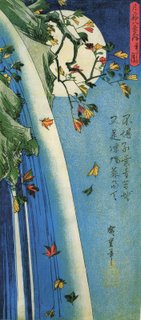 Hiroshige, The Moon Over A Waterfall - woodblock print
The sage has three treasures
simplicity
patience
compassion
-Basho
 Maple Kanji Zen Alarm Clock, progressive chime alarm clock
Now & Zen
1638 Pearl Street
Boulder, CO 80302
Posted in Bamboo Chime Clocks, Chime Alarm Clocks, Japanese Inspired Zen Clocks, Japanese Poetry, Meditation Timers, Meditation Tools, Natural Awakening, Now & Zen Alarm Clocks, Yoga Timers by Now & Zen, Zen Timers
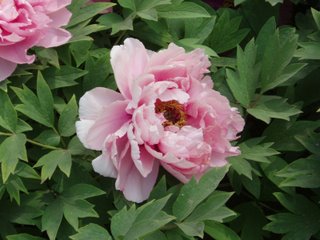 Paeonia Suffruticosa Peonies scattering,
two or three petals
lie on one another.
-buson-
 Zen Chime Clock with Maple Leaves in Honey Finish, progressive awakening clock
Now & Zen
1638 Pearl Street
Boulder, CO 80302
Posted in Bamboo Chime Clocks, Japanese Inspired Zen Clocks, Japanese Poetry, Meditation Timers, Meditation Tools, mindfulness practice, Natural Awakening, Now & Zen Alarm Clocks, Progressive Awakening, Yoga Timer, Zen Timepiece by Now & Zen
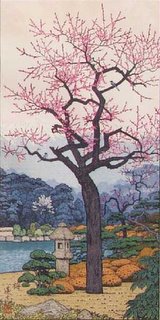 Yoshida, "Plum" woodblock print Moon, plum blossoms,
this, that,
and the day goes.
-Issa-
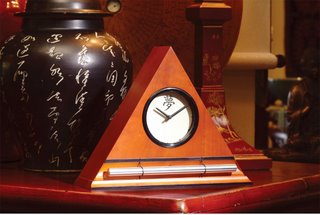 Zen Alarm Clock with Chime and Dream Kanji Dial Face
Now & Zen
1638 Pearl Street
Boulder, CO 80302
Posted in Chime Alarm Clocks, Japanese Inspired Zen Clocks, Meditation Tools, mindfulness practice, Natural Awakening, Now & Zen Alarm Clocks, Progressive Awakening, Well-being, Yoga Timer, Zen Timers
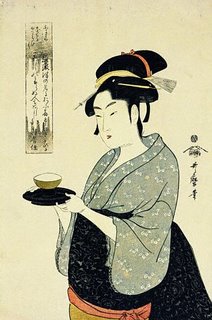 Kitagawa Utamaro Ukiyo-e, wabi-cha Wabi-cha, or wabi-tea, is a style of Japanese Tea Ceremony particularly associated with Sen no Rikyu and Takeno Joo before him. Wabi-cha emphasizes simplicity. The term came into use in the Edo era (1603 to 1868), prior to which it was known as wabi-suki, suki generally referring to the concept of “artistic inclination,” and “wabi” literally meaning ‘forelorn’.
adapted from wikipedia.org
 Zen Chime Clock with Japanese Maple Leaves in Honey Finish Now & Zen
1638 Pearl St.
Boulder, CO 80302
Posted in Bamboo Chime Clocks, Chime Alarm Clocks, Japanese Inspired Zen Clocks, Meditation Timers, Meditation Tools, mindfulness practice, Natural Awakening, Now & Zen Alarm Clocks, Progressive Awakening, Yoga Timer, Yoga Timers by Now & Zen, Zen Timers
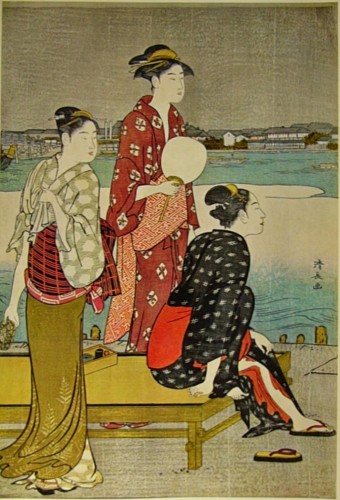 Kiyonaga Riverside Ukiyo-e The phrase iki is generally used in Japanese culture to describe qualities that are aesthetically appealing and when applied to a person, what they do, or have, constitutes a high compliment.
Iki is not found in nature. While similar to wabi-sabi in that it disregards perfection, iki is a broad term that encompasses various characteristics related to refinement with flair.
The tasteful manifestation of sensuality can be iki.
Etymologically, iki has a root that means pure and unadulterated. However, it also carries a connotation of having an appetite for life. Iki is never cute.
The basis of iki is thought to have formed among urbane commoners (chonin) in Edo in the Tokugawa period (1603 to 1868). Iki is sometimes misunderstood as simply “anything Japanese”, but it is actually a specific aesthetic ideal, distinct from more ethereal notions of transcendence or poverty. As such, samuri, for example, would typically, as a class, be considered devoid of iki, (see yabo).
At the same time, individualistic warriors are often depicted in contemporary popular imagination as embodying the iki ideals of a clear, stylish manner and blunt, unwavering directness. The term became widespread in modern intellectual circles through the book The Structure of “Iki” (1930) by Kuki Sukuzo.
adapted from wikipedia.org
 Digital Zen Timers, a mindfulness practice tool Now & Zen
1638 Pearl Street
Boulder, CO 80302
Posted in Bamboo Chime Clocks, Beauty, Meditation Tools, mindfulness practice, Natural Awakening, Now & Zen Alarm Clocks, Progressive Awakening, wabi-sabi, Yoga Timer, Zen Timers
 yugen, a profound mysterious sense of the beauty of the universe Yūgen is an important concept in traditional Japanese aesthetics. The exact translation of the word depends on the context. In the Chinese philosophical texts the term was taken from, yūgen meant “dim”, “deep” or “mysterious”. In the criticism of Japanese waka poetry, it was used to describe the subtle profundity of things that are only vaguely suggested by the poems, and was also the name of a style of poetry (one of the ten orthodox styles delineated by Fujiwara no Teika in his treatises).
Yugen suggests that beyond what can be said but is not an allusion to another world. It is about this world, this experience. All of these are portals to yugen:
“To watch the sun sink behind a flower clad hill. To wander on in a huge forest without thought of return. To stand upon the shore and gaze after a boat that disappears behind distant islands. To contemplate the flight of wild geese seen and lost among the clouds. And, subtle shadows of bamboo on bamboo.”
Zeami Motokiyo
Yugen is said to mean “a profound, mysterious sense of the beauty of the universe… and the sad beauty of human suffering”.
adapted from wikipedia.org
 Japanese Maple Leaves Dial Face, the Zen Alarm Clock for a progressive awakening Now & Zen
1638 Pearl Street
Boulder, CO 80302
Posted in Bamboo Chime Clocks, Chime Alarm Clocks, Goodness, Meditation Timers, Meditation Tools, mindfulness practice, Natural Awakening, Now & Zen Alarm Clocks, Progressive Awakening, wabi-sabi, Zen Timers
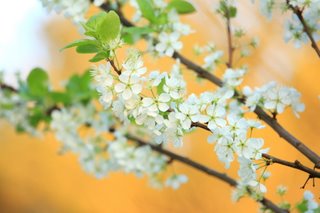 plum blossoms, one of the four noble gentlemen The “Four Gentlemen”, also called the Four Noble Ones or Four Friends, in Chinese art refers to four plants: the orchid, or ran; the bamboo; the chrysanthemum, or kiku; and the plum blossom, or ume (italics are in Japanese). The term compares the four plants to Confucianist junzi, or “gentlemen”. A painting or decoration incorporating all four plants is also known as the “Four Gentlemen”. They are most typically depicted in traditional ink and wash painting. The “Four Gentlemen” belong to the category of bird-and-flower painting in Chinese art.
The Four Gentlemen have been used in Chinese painting since the time of the Chinese Song Dynasty (960–1279) because of their refined beauty, and were later adopted by artists in Korea, Japan, and Vietnam. As they represent the four different seasons (the plum blossom for winter, the orchid for spring, the Chrysanthemum for autumn, and the bamboo for summer), the four are used to depict the unfolding of the seasons through the year.
adapted from wikipedia.org
 Zen Alarm Clock with Chime and Dream Kanji Dial Face Now & Zen
1638 Pearl Street
Boulder, CO 80302
Posted in Bamboo Chime Clocks, Chime Alarm Clocks, Japanese Inspired Zen Clocks, Meditation Tools, mindfulness practice, Natural Awakening, Now & Zen Alarm Clocks
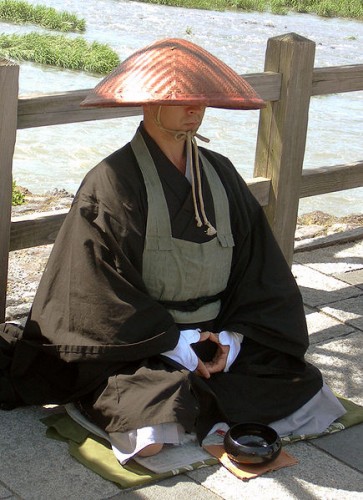 zen monk The term mendicant refers to begging or relying on charitable donations, and is most widely used for religious followers or ascetics who rely exclusively on charity to survive.
In principle, medicant orders or followers do not own property, either individually or collectively, and have taken a vow of poverty, in order that all their time and energy could be expended on practicing or preaching their religion or way of life and serving the poor.
Many religious orders adhere to a mendicant way of life, including the Catholic mendicant orders, Hindu ascetics, some dervishes of Sufi Islam, and the monastic orders of Janism and Buddhism. In the Catholic Church, followers of Saint Francis of Assisi and Saint Dominic became known as mendicants, as they would beg for food while they preached to the villages.
adapted from wikipedia.org
 Digital Zen Alarm Clocks, available in maple, walnut, bamboo, and black lacquer Now & Zen
1638 Pearl Street
Boulder, CO 80302
Posted in Bamboo Chime Clocks, Chime Alarm Clocks, Natural Awakening, Now & Zen Alarm Clocks, prayer, Progressive Awakening, Yoga Timers by Now & Zen
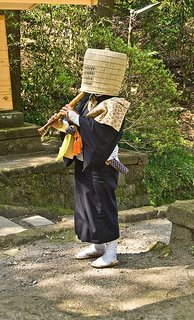 A Buddhist monk begging as a komusō A komusō, was a Japanese begging monk of the Fuke school of Zen Buddhism, during the Edo period of 1600-1868. Komusō were characterised by the straw basket (a sedge or reed hood named a tengai) worn on the head, manifesting the absence of specific ego. They are also known for playing solo pieces on the shakuhachi (a type of Japanese bamboo flute).
These pieces, called honkyoku (“original pieces”) were played during a meditative practice called suizen for alms, as a method of attaining enlightenment, and as a healing modality. The Japanese government introduced reforms after the Edo period, abolishing the Fukè sect. Records of the musical repertoire survived, and are being revived in the 20th century.
adapted from wikipedia.org
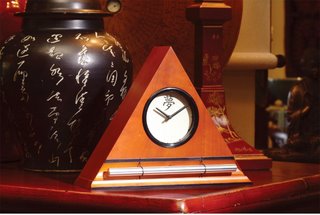 Kanji Dial Face in Honey Finish, Zen Alarm Clocks with a progressive chime
Now & Zen
1638 Pearl Street
Boulder, CO 80302
Posted in Chime Alarm Clocks, Japanese Inspired Zen Clocks, Meditation Timers, Meditation Tools, mindfulness practice, Natural Awakening, Now & Zen Alarm Clocks, zen monks
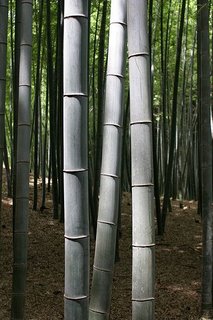 Bamboo trees in Kyoto, Japan Bamboo are a group of perennial evergreen (except for certain temperate species) plants in the true grass family Poaceae, subfamily Bambusoideae, tribe Bambuseae. Giant bamboos are the largest members of the grass family.
Bamboos are also the fastest growing woody plants in the world. They are capable of growing up to 60 centimeters (24 in.) or more per day due to a unique rhizome-dependent system. However, this astounding growth rate is highly dependent on local soil and climatic conditions.
Bamboos are of notable economic and cultural significance in East Asia and South East Asia where they are used extensively in everyday life as building materials, as a food source and as a highly versatile raw product.
adapted from wikipedia.org
 Bamboo Chime Alarm Clock, for a progressive awakening
Now & Zen
1638 Pearl Street
Boulder, CO 80302
Posted in Bamboo Chime Clocks, Japanese Inspired Zen Clocks, Meditation Timers, Meditation Tools, Natural Awakening, Now & Zen Alarm Clocks, Progressive Awakening, Zen Timers
« Previous Page — « Previous Entries
Next Entries » — Next Page »
|
|
|
|